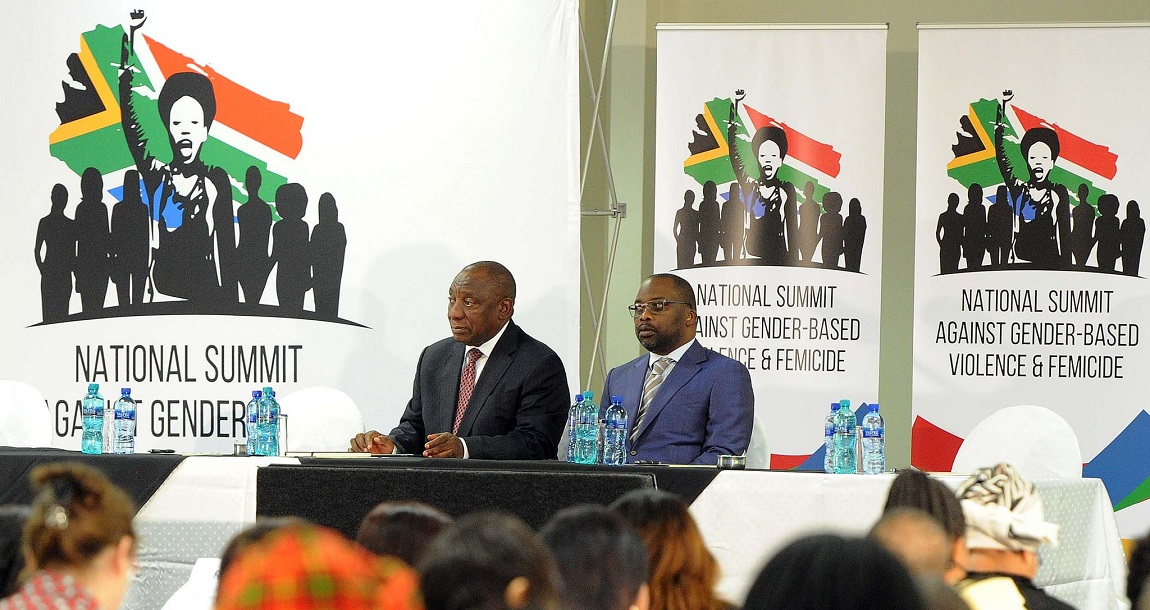African National Congress (ANC) spokesperson Pule Mabe and acting spokesperson Zizi Kodwa agreed to step aside from their duties amid the allegations of sexual harassment and rape leveled against them. This, after the ANC asked them to do so. The step is long overdue and reveals the disjuncture between the ANC government and the ANC party.
The ANC government committed to actively eradicating gender-based violence and femicide at the Gender Summit held in November last year. The ANC party, however, proved lacklustre and unconvincing in their response to the allegations against their spokespeople. News24 is reporting that both Mabe and Pule would still remain active in Luthuli House and will not be formally suspended.
At Gender-Based Violence Summit, Ramaphosa Calls For ‘Tangible Solutions’
Zizi Kodwa: rape allegations
Just when the ANC cleared Mabe of his sexual harassment allegations, Kodwa has been accused of rape.
Duarte confirmed that the party received a complaint of rape against Kodwa over the weekend. A woman wrote a letter accusing Kodwa of drugging her and another woman and raping her in an apartment at Michelangelo in Sandton on April 14, 2018.
Kodwa has shut down the claims as factional. He also said he would consult with his lawyers on a way forward. Duarte said the party had also advised the complainant to take the matter with law enforcement agencies.
Pule Mabe: sexual harassment allegations
Kgoerano Kekana, formerly a personal assistant to Mabe, accused the politician of three counts of sexual harassment in the four months she worked with him. In a 14-page letter to ANC deputy secretary general Jessie Duarte last year, Kekana detailed the sexual harassment she experienced working with Mabe.
Kekana said Mabe offered her a job in exchange for sex. She said Mabe forced himself onto her bed on two occasions. When she rejected his advances, Mabe ill-treated her and slashed her salary.
In response to the matter, the ANC set up an internal disciplinary hearing. In December Mabe stepped down from duties as the ANC national spokesperson pending the results of the hearing.
Mabe then returned to work in February, after being cleared by the grievance panel. Kekana said in an interview with EWN that she’s disappointed in the ANC and that she felt unsafe and uncomfortable around Mabe.
“I don’t regret ever having to have reported Pule because I suffered for four months in that office, for four months. I have been [through] hell,” Kekana told EWN.
In the interview, she urged those being sexually harassed to gather the strength and speak up. “The minute you come out and speak about it, that is when you become free. You tell other people to say this is what I’ve been through and people will be able to support you in this journey,” she said.
Kodwa and Mabe aside, the ANC has received a number of accusations of sexual abuse against their employers over the years.
How the ANC has dealt with similar cases
Former MP and singer Jennifer Ferguson accused ANC politician and soccer boss Danny Jordaan of rape in 2018. Another woman opened a case against Jordaan over a month after Ferguson opened a case of rape against Jordaan. The ruling party was silent on Jordaan.
When a 21-year-old intern brought similar allegations forward against Western Cape ANC leader Marius Fransman, it took the ANC’s integrity committee four months to deal with the matter. Fransman was found guilty of two counts of sexual harassment of the intern at the ANC’s anniversary celebrations in 2016 and now faces criminal charges.
In November 2007, the ANC fired its parliamentary chief whip Mbulelo Goniwe, over a year after he was charged for attempting to solicit sexual favours from parliamentary intern Nomawele Njongo. Fezekile Kuzwayo was not as successful in her allegations against the former president.
Former President Jacob Zuma was acquitted of the charges of rape levelled against him by Kuzwayo, who was known to the nation as Khwezi, in 2005.
South Africa’s #MeToo gap: No accountability for high-profile men
Taking these cases into consideration, it’s baffling that the party does not have a sexual harassment policy in place.
What this means for the fight for gender justice
Sexual harassment in the workplace is, unfortunately, common. With the rise of the #MeToo movement, and especially South Africa’s own battle against gender-based violence it is unforgivable for the ANC not to have a sexual harassment policy. Further, it is necessary for the ANC to conduct harassment training with its staff on a regular basis.
As government, the ANC committed to elaborate resolutions in the fight against gender-based violence in November. But as a party, the ANC is not so convincing. Considering the upcoming national election, the ANC treatment of the Mabe/ Kodwa cases will send a clear message to the electorate about how serious the party is about gender justice.
While it’s a travesty that so many women’s suffering has to be linked to the upcoming election, the way the party behaves sets a national precedent. From where we’re sitting, it doesn’t look good.









